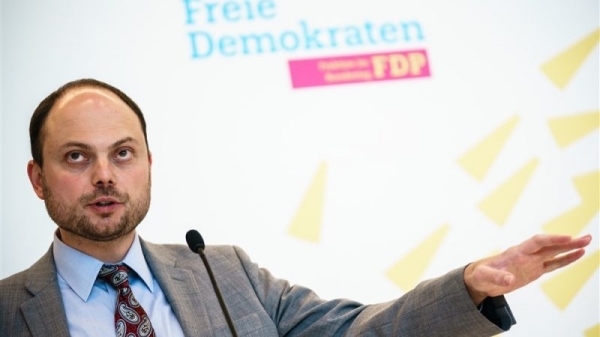Kremlin critic Kara-Murza goes on trial for treason

Russia on Monday (13 March) began the closed-door trial of jailed opposition activist Vladimir Kara-Murza, who faces more than two decades in prison on charges including treason for comments critical of the Kremlin.
His high-profile trial is the latest in a string of cases against opposition voices in Russia in a crackdown that has intensified since President Vladimir Putin deployed troops in Ukraine last year.
Kara-Murza, 41, is accused of high treason, spreading “false” information about the Russian army and being affiliated with an “undesirable organisation”.
He faces up to 25 years in jail, one of his lawyers, Vadim Prokhorov, told reporters on Monday.
“We have returned to Stalinist times. To enormous Stalinist sentences,” Prokhorov said after Monday’s hearing, referring to Soviet dictator Joseph Stalin.
The next hearing will take place on 16 March, Prokhorov added, saying that “authorities want to settle everything at a lightspeed pace”.
‘True Russian patriot’
Kara-Murza was detained in April last year on charges of disseminating what the authorities deem to be “fake news” about the Russian army.
That case was launched over his address about Russia’s Ukraine offensive to members of the lower house of the Arizona Legislature last March.
In August 2022, Kara-Murza was accused of being affiliated with an “undesirable organisation” for participating in a conference in support of political prisoners.
In October he was charged with treason over remarks critical of Moscow made at three public events abroad, his lawyer told the state-run TASS news agency, insisting the comments “did not pose any threat to the country”.
“A true Russian patriot, he stands accused of high treason for his tireless fight for a Putin-free Russia,” his wife Evgenia Kara-Murza tweeted on Monday.
Won’t ‘give up’
A Russian citizen by birth, Kara-Murza received British citizenship after moving to the United Kingdom with his mother when he was 15.
The Western-educated activist and journalist was a close associate of opposition leader Boris Nemtsov, who was shot dead near the Kremlin in 2015, and Mikhail Khodorkovsky, a former oligarch turned Putin critic.
Kara-Murza says he was poisoned twice — in 2015 and 2017 — because of his political activities, but he continued to spend long periods of time in Russia.
In an interview with AFP in June 2021, Kara-Murza said he had no intention of permanently leaving Russia.
“There was no scenario under which I would not come back. We are Russian politicians. Our place is here at home in Russia,” he said.
“The biggest gift that those of us who oppose Vladimir Putin could give to the Kremlin would be to give up and run away,” Kara-Murza added.
In October 2022, Kara-Murza was awarded the Vaclav Havel Human Rights Prize by the Parliamentary Assembly of the Council of Europe.
Stamping out dissent
Russia has added Kara-Murza to its foreign agent list — a label reminiscent of the “enemy of the people” branding that was used during Soviet times to isolate dissidents.
Moscow has stepped up efforts to stamp out dissent in the year since Putin sent troops into Ukraine.
Almost all of Putin’s best-known political opponents have either fled the country or are in jail.
Putin’s most vocal domestic critic Alexei Navalny is currently serving a nine-year jail term on embezzlement charges widely seen as political.
Navalny in 2020 survived a near-fatal poisoning with a Soviet-made nerve agent, blaming the attack on the Kremlin.
He was arrested in January 2021 on his return to Moscow after receiving treatment in Germany.
“Navalny,” a film that examines the poisoning of the jailed dissident, on Sunday won the Oscar for best documentary feature at the Academy Awards ceremony in Hollywood.

’Navalny,’ portrait of Kremlin critic, wins best documentary Oscar
The film “Navalny” about the poisoning that nearly killed Alexei Navalny, Russia’s most prominent opposition leader, and his detention upon his 2021 return to Moscow, won the Oscar for best feature documentary on Sunday (12 March).
Another prominent opposition politician Ilya Yashin was in December last year sentenced to eight years and six months in a penal colony for his Ukraine remarks.



